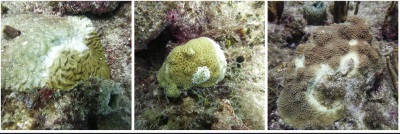 PHILIPSBURG:---- The Nature Foundation has been frequently monitoring the impact of Stony Coral Tissue Loss Disease on St Maarten coral reefs in the last months, to be able to determine the presence of the coral disease and compare the disease outbreak with data from March. The coral disease was first discovered on St Maarten reefs in October 2019. The ongoing roving diver surveys indicate that the disease is still strongly impacting the coral colonies on St Maarten reefs and most corals that became infected by the tissue loss disease have either perished or are still showing visible signs of the disease. Healthy looking colonies of the more ‘highly susceptible species’, such as species from Meandrina, Dendrygya, Dichocoenia, Pseudodiploria and Diploria genus, became very scarce on the reefs.
PHILIPSBURG:---- The Nature Foundation has been frequently monitoring the impact of Stony Coral Tissue Loss Disease on St Maarten coral reefs in the last months, to be able to determine the presence of the coral disease and compare the disease outbreak with data from March. The coral disease was first discovered on St Maarten reefs in October 2019. The ongoing roving diver surveys indicate that the disease is still strongly impacting the coral colonies on St Maarten reefs and most corals that became infected by the tissue loss disease have either perished or are still showing visible signs of the disease. Healthy looking colonies of the more ‘highly susceptible species’, such as species from Meandrina, Dendrygya, Dichocoenia, Pseudodiploria and Diploria genus, became very scarce on the reefs.
In the last two months the Foundation found an average of 30% infection rates of the susceptible stony corals in the Marine Park ‘Man of War Shoal’. On coral reefs outside the Marine Protected Area, a lower average was found; about 20% of the affect corals species are currently diseased, undoubtedly due to that most ‘susceptible species’ already perished earlier this year. However, certain susceptible coral species show much higher disease rates, such as species from the genus ‘Orbicella’, 50% of these coral colonies are still infected with Tissue Loss Disease. The higher proportion of diseased Orbicella species in a later stage is the typical trend to be seen when tissue loss disease infects coral reefs as these species take longer to pass away.
“We found lower infection rates compared to previous surveys done in March this year, however, this does not mean that the disease its effects decreased. Most coral colonies that were infected with the disease already died in the last months, leaving less diseased corals behind. During the recent surveys, we hardly found any coral colonies from the species which are marked by experts as ‘highly susceptible’ to the disease, which indicates that these species already perished and have been overgrown by algae and other marine life. It is time that we panic about the health of our reefs, as coral reefs are of great importance to our tourist industry, the health of our fish stocks, clarity of our waters and the protection from storms” explained Nature Foundation’s Manager Melanie Meijer zu Schlochtern.
The Nature Foundation used the Roving Diver methodology in order to establish the impact of Tissue Loss disease on coral reefs. During the research scientific divers conduct a swim around the site, focusing on species that are primarily impacted by the disease outbreak, and all stony coral species and their level of disease impact are being recorded. This research provides insight into the order in which species are affected, the rate of spread of the disease and the frequency across different coral reef site.
“The disease has been moving very fast on our coral reefs, affecting many corals in a short time period. Our coral reefs were already highly threatened due to pollution, wastewater and nutrient input, hurricane Irma and rising ocean temperatures. Especially wastewater and even plastic presence can easily decrease the resilience of our corals, the fast rate of this disease shows that our corals are more susceptible. Therefore, it is of high importance to keep our waters clean, ban single-use plastics and prioritize to obstruct further sewage and pollution run-off in our waters” continued Meijer zu Schlochtern.
Tissue loss disease is a relatively new issue that has been plaguing coral reefs in the Atlantic Basin for the last year. The coral reef disease manifests itself through the creation of white blotches on stony coral, eventually leading to the loss of tissue and eventual death in the coral colony. The disease affects 20 different coral species is able to kill colonies within several weeks or months. The Nature Foundations recommends all divers to be vigilant to not spread the disease. The disease appears to be waterborne and may potentially be spread by divers their gear according to the Florida Disease Advisory Committee. They advise scuba divers in the Caribbean and Florida to soak their gear in a 5% chlorine bleach solution for 30 minutes, and rinse well after, especially when moving in between locations. Nature Foundation also advises all divers to be aware of their fins and to not touch any diseased or healthy coral; as you will probably transmit the disease to other corals!











